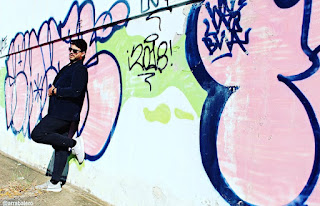Rosa Ácido (2024)
Rosa Ácido (2024), the most recent poetic offering by Federico Irizarry-Natal, resonates as a lyrical artifact where language presses against itself until it fractures into visceral metaphors, broken verses, ignited images, and bleeding silences.
Published under the Espejitos de Papel imprint, this collection not only reaffirms the author’s unique voice but elevates it to a plane of aesthetic and critical maturity. The format (sober, pleasant to the touch, well-crafted) houses a compact poetic corpus and a great deal of poetic energy.
The work opens passages where the human and the divine seem to coexist in a field of symbolic tension.
In verses like “a compact block of animality / surrounded by angels; a terrified angel / before the sharp fangs of the hyena,” the lyrical subject moves between bestial urges and celestial figures, not as binary oppositions but as coexisting energies that generate human drama and dialogue. Here, the angel is not a redeemer but a witness to the heart’s tearing.
A collective consciousness runs through the book: “ultimately constructed by all” reveals that language, poetry, and history are not individual gestures but shared, social architectures. It is the Other who reveals.
Irizarry-Natal thus summons the reader, not as a passive witness, but as a co-conspirator in the poetic process/imagination: “if you attend, as I do, this offering.”
Among its images, many with a strange philosophical flavor, we find scenes of intimate devastation and minimalist epic: “in that sticky cosmic silence / which was more like / an a cappella struggle,” where silence is not emptiness but unaccompanied battle, a body alone before the roar of the real.
There is also ruin and fire: “something of / a tomb / in the flames given over to the havoc of matches,” as if every act of ignition were also a surreal farewell.
Time (construction and fiction) is subverted in verses like “there’s little use / in mending the clock hand / that confuses the minute hand and the swallow.” The mismatch between nature and mechanism points to the failure of linear chronology before the virtuality of lived experience.
In other fragments, Irizarry-Natal articulates a poetics of failure and impossibility: “incapable of distributing clandestine ballots,” “(that biting nonsense of salts),” “a ring fitted to the slowness of snails”, symbols of slowness, marginality, secrecy, of a silenced class struggle.
Each image glides with the logic of dreams, where nonsense is the most precise mode of saying.
There are painful steps in the journey: “each / footstep / a lark / ill / in the landscape.” As if walking were already a wound, and the bird, a classic symbol of freedom, were broken from the start. Still, the book does not enclose itself in pain: there is a kind of beauty that emerges like an explosion, but not without consequences: “an explosion of beauty that hurts.” A smiling whip.
The end of the book suggests a poetics of return: “always arriving for the first time at the place where we met.” It is a rereading of the encounter as unfinished destiny, as necessary repetition.
Hence, life and poetry coincide, as stated in one of the most memorable verses: “to coincide has been a trapeze artist’s trajectory.” An affirmation that celebrates the fragility of human balance and the audacity of connection.
With Rosa Ácido, Irizarry-Natal delivers a collection of great emotional and symbolic intensity, daring to name what burns, what collapses, what cannot be rebuilt. He quotes Cioran to announce it, with a crooked smile: “Publishing a book implies the same kind of complications as a wedding or a funeral.” And indeed, Rosa Ácido is both at once: a matrimonial chant with loss, a celebratory elegy of language when it becomes resistance.
Now available at Librería El Candil, La Jagua Books, or through poet-editor Edgardo Nieves Mieles at McHondo, this book is not only read: it is attended, as one would a classroom.
-ER
*******




Comments
Post a Comment